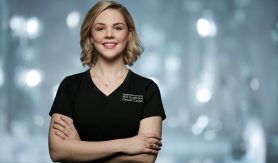- Diseases
- Acoustic Neuroma (14)
- Adrenal Gland Tumor (24)
- Anal Cancer (68)
- Anemia (2)
- Appendix Cancer (16)
- Bile Duct Cancer (26)
- Bladder Cancer (72)
- Brain Metastases (28)
- Brain Tumor (232)
- Breast Cancer (714)
- Breast Implant-Associated Anaplastic Large Cell Lymphoma (2)
- Cancer of Unknown Primary (4)
- Carcinoid Tumor (8)
- Cervical Cancer (158)
- Colon Cancer (166)
- Colorectal Cancer (116)
- Endocrine Tumor (4)
- Esophageal Cancer (44)
- Eye Cancer (36)
- Fallopian Tube Cancer (8)
- Germ Cell Tumor (4)
- Gestational Trophoblastic Disease (2)
- Head and Neck Cancer (12)
- Kidney Cancer (128)
- Leukemia (342)
- Liver Cancer (50)
- Lung Cancer (286)
- Lymphoma (278)
- Mesothelioma (14)
- Metastasis (30)
- Multiple Myeloma (100)
- Myelodysplastic Syndrome (60)
- Myeloproliferative Neoplasm (4)
- Neuroendocrine Tumors (16)
- Oral Cancer (100)
- Ovarian Cancer (172)
- Pancreatic Cancer (160)
- Parathyroid Disease (2)
- Penile Cancer (14)
- Pituitary Tumor (6)
- Prostate Cancer (146)
- Rectal Cancer (58)
- Renal Medullary Carcinoma (6)
- Salivary Gland Cancer (14)
- Sarcoma (238)
- Skin Cancer (296)
- Skull Base Tumors (56)
- Spinal Tumor (12)
- Stomach Cancer (64)
- Testicular Cancer (28)
- Throat Cancer (92)
- Thymoma (6)
- Thyroid Cancer (96)
- Tonsil Cancer (30)
- Uterine Cancer (80)
- Vaginal Cancer (16)
- Vulvar Cancer (20)
- Cancer Topic
- Adolescent and Young Adult Cancer Issues (20)
- Advance Care Planning (10)
- Biostatistics (2)
- Blood Donation (18)
- Bone Health (8)
- COVID-19 (362)
- Cancer Recurrence (120)
- Childhood Cancer Issues (120)
- Clinical Trials (630)
- Complementary Integrative Medicine (22)
- Cytogenetics (2)
- DNA Methylation (4)
- Diagnosis (232)
- Epigenetics (6)
- Fertility (62)
- Follow-up Guidelines (2)
- Health Disparities (14)
- Hereditary Cancer Syndromes (126)
- Immunology (18)
- Li-Fraumeni Syndrome (8)
- Mental Health (116)
- Molecular Diagnostics (8)
- Pain Management (62)
- Palliative Care (8)
- Pathology (10)
- Physical Therapy (18)
- Pregnancy (18)
- Prevention (914)
- Research (392)
- Second Opinion (74)
- Sexuality (16)
- Side Effects (604)
- Sleep Disorders (10)
- Stem Cell Transplantation Cellular Therapy (216)
- Support (402)
- Survivorship (320)
- Symptoms (182)
- Treatment (1786)
3 ways MD Anderson nurses make our patients feel safe and cared for
3 minute read | Published September 19, 2019
Medically Reviewed | Last reviewed by an MD Anderson Cancer Center medical professional on September 19, 2019
I knew that I wanted to be a nurse pretty early on. My grandmother was diagnosed with colorectal cancer when I was in the eighth grade, and I watched as her nurses went about their duties. I thought they had a great job, and I wanted that for myself one day.
I fulfilled the first part of my dream by earning a nursing degree from The University of Texas Medical Branch in Galveston. I fulfilled the second part when I joined MD Anderson in 2017. Now, I work with patients in the post-anesthesia care unit at MD Anderson West Houston. My job is to make sure they’re stable after surgery or diagnostic procedures so they can go home. I really enjoy it.
Nurses are a special breed, in that we feel driven to take care of people. But there’s more to nursing than just that aspect of it. Nurses have a lot of qualities other than compassion that make our patients feel safe and cared for. Here are three that I’ve noticed in my colleagues at MD Anderson.
1. We keep our word
Some of my patients don’t have anyone who can stay with them while they’re receiving cancer treatment. And when you’re alone in that hospital room and all you have is the nurse to provide you with both care and information, you want someone who’s responsive and does what they say they’re going to do.
So if I tell someone I’ll come back in an hour, then I come back in an hour. And sometimes, after completing my rounds, I’ll take off my gloves and just hold someone’s hand for a few minutes, so they don’t feel quite so alone.
2. We are experts
Nursing is such a huge field that people can go into any area they want. And medicine is so vast that it’s impossible to know everything.
But specializing in one area and developing your craft is good for patients. Because when they notice my confidence in handling a tracheostomy tube, for instance, or see that I can communicate with them effectively about a particular treatment or side effect, it eases their minds. And that gives them more confidence — both in me and in MD Anderson.
3. We stay positive
Cancer is the worst thing that has ever happened to many of my patients. So, I try to keep that in mind as I care for them and imagine myself in their situation. Mostly, I just try to treat them the way I’d want to be treated. That always brings out my best.
I never cease to be inspired by my patients. So many of them are going through really hard things, but sometimes, they’re even happier than I am. Almost daily, I hear, “I’m just happy to be here.” And attitude makes a big difference. So, when I leave work, I count my blessings. And feel grateful to be a part of Making Cancer History®.
Request an appointment at MD Anderson online or by calling 1-877-632-6789.

I never cease to be inspired by my patients.
Barbara Holley
Nurse





